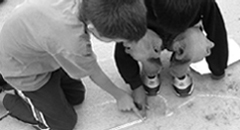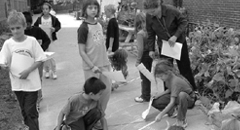
|

|

|
With regard to the relationship between MLV and teacher action research, we discussed the potential gap between teachers in the field who see themselves as researchers and academic research. One teacher educator described documentation as a tool for transformation; she saw documentation as "participatory action research" in which you carry out research in your own context in order to generate social transformation. She pointed to the philosophical and political aspects of documentation that involve both questioning our image of the teacher and making our research public. Other differences between documentation and action research include:
- Documentation creates a culture of listening among adults and children. Cultivating the ability to listen is not a central feature of most action research.
- Documentation engages multiple audiences, including the wider community. In a more traditional action research approach, teacher-researchers typically identify one audience (e.g., students, fellow teacher-researchers) and stick with it. Documentation creates a collective body of knowledge that can be shared in the community--schools, libraries, museums, the town hall.
- Documentation often leads to the creation of a product. Even when action researchers write a paper as their product, there is an aesthetic and emotional difference between a paper and products of documentation which can be shared with children and adults. Documentation generates a process and product that live and bring pleasure, meaning, and joy to those who create or encounter it. It is intended to provoke thinking and feeling. Most inquiry groups do not ask people to create something that represents their thinking or emotions. One contribution documentation might make to the action research cycle is to prompt action researchers to share their findings and feelings back with students.
- Documentation creates as well as transmits culture, values, and democracy. Documenting learning causes us to evaluate possible gaps between our values and beliefs and our goals. Documentation can help teachers embrace the tension between their values and beliefs and their goals, and identify and address gaps especially if their own goals do not reflect those of the school or surrounding community. Documentation reinforces and makes public our values; it supports democracy by bringing children's and adults' voices into schools and communities that often go unheard.
- Documentation is not easily viewed as scholarship. The question came up of how this type of research might link to the academic field of research without losing its essence.
[Home] [Site Map]